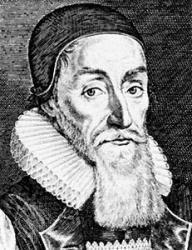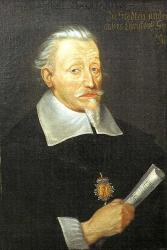Planning worship?
Check out our sister site, ZeteoSearch.org,
for 20+ additional resources related to your search.
- |
User Links
Person Results
Joseph Hall

1574 - 1656 Author of "Immortal Babe, Who This Dear Day" in The Cyber Hymnal Hall, Joseph, D.D., was born at Ashby-de-la-Zouch in 1574, and educated at Cambridge. He was successively Rector of Halstead, Prebendary of Wolverhampton, Dean of Worcester, Bishop of Exeter, and Bishop of Norwich. In July, 1616, he attended Lord Doncaster into France, and on his return he was appointed by King James as one of his divines to accompany him into Scotland. At the Synod of Dort he was appointed to preach the Latin Sermon to the Assembly. He died in 1656. His works are numerous, and include his versions of Ps. i.-ix. [No. 43.] His Works were published in London by Pavier, 1625.
--John Julian, Dictionary of Hymnology (1907)
Joseph Hall
Heinrich Schütz

1585 - 1672 Person Name: Heinrich Schütz, 1585-1632 Composer of "[Immortal Babe Who this dear day]" in Uncommon Christmas Carols Heinrich Schütz (baptized Oct. 9, 1585-1672) was the greatest German composer of the seventeenth century and the first to reach international prominence. His influence was felt for more than two centuries after his death.
In 1598, after hearing the young Henrich sing, the Landgrave Moritz of Hessen-Kassel began a campaign to have the boy study at Kassel. In 1599, Christoph Schütz took his son to the landgrave’s seat, where he served as a choirboy and pursued his education showing particular facility in Greek, Latin, and Frence. After he lost his treble voice, he set out for the University of Marburg, where he studied law. But under the sponsorship of the landgrave, Heinrich went to Venice (1609) and studied with Giovanni Gabrieli until Gabrieli’s death in 1612. In 1613 he returned to Germany, once again studying law while serving as organist to the landgrave. He was lent to Johann Georg I of Saxony (1614) and subsequently became director of the chapel, a position he held the rest of his life. The untimely death of his wife after six years of marriage (1625) led him to devote himself to the composition of church music. After several petitions Schütz was granted leave to study with Claudio Monteverdi and once again set out for Venice. For much of his life the Thirty Years’ War obstructed his work, and he spent time moving from court to court in Europe, finally settling in Dresden in 1641, where he died.
--The Presbyterian Hymnal Companion, 1993
Heinrich Schütz
Bartholomew Brown
1772 - 1854 Person Name: Bartholomew Brown (1772-1854) Composer of "WILLIAMSTOWN" in An American Christmas Harp
Bartholomew Brown


 My Starred Hymns
My Starred Hymns


